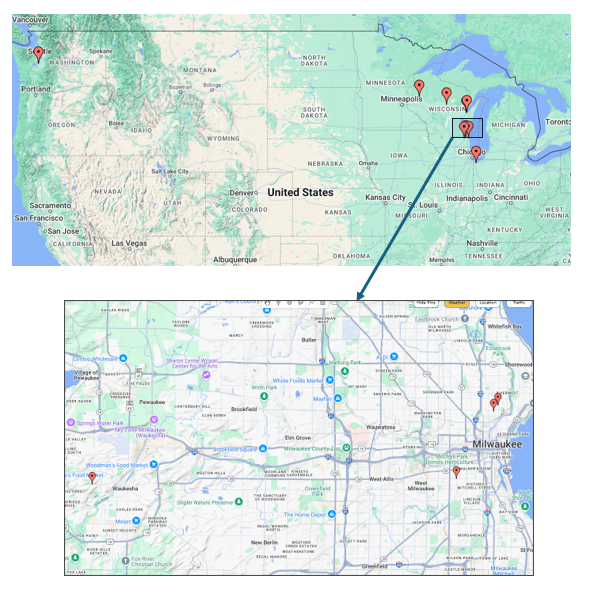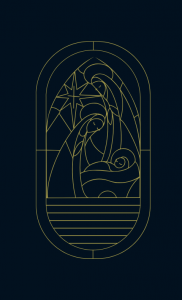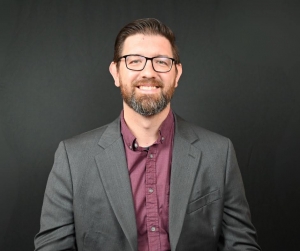Term B Starts with a Second Cohort!
/in Nontraditional Education News /by lagrowna
On January 5, 2025 the CBTE Term B began. The learners who began their studies in September continued with their next two courses. A new cohort of eleven learners also began their studies. Eight learners started a new entirely online cohort, and three students started the first Milwaukee-based cohort. The Milwaukee-based cohort will meet weekly as part of their Biblical Literature and History courses at the St. Marcus North Campus. We look forward to supporting our returning and new learners as they study to serve in the public ministry of the WELS.
Pausing at Christmas
/in Nontraditional Education News /by lagrownaThere is much to celebrate.
We are quickly approaching the celebration of our Savior’s birth. Our churches, schools, and homes are filled with the joyful preparations and comforting traditions of our Christmas season. One of our family’s traditions is to share an Advent Devotion after we have finished our evening meal. It is a moment to pause and reflect on the greatest gift we have received through Grace alone, by faith alone.
We are quickly nearing the end of our first CBTE term, preparing for the second term, and completing the enrollment process for our second CBTE cohort to begin their classes in January 2025.
We are all looking forward to several weeks of a break. However, a pause between terms does not pause our most important work, strengthening our faith in the promise fulfilled through Jesus’ birth, life, death, and resurrection.
MLC Faculty and CBE: Dr. Steenbock
/in Nontraditional Education News /by lagrowna Dr. Brandon Steenbock currently serves as a Staff Minister at St. Mark Ministries in DePere, Wisconsin. He is an adjunct instructor of online courses offered at MLC. For the CBTE Theology Minor he worked closely with our instructional designer to align the content and activities of Christian Doctrine I and II with the competencies created by our full-time Theology faculty. He is teaching Christian Doctrine I and II for the initial cohorts of learners enrolled in the CBTE Theology Minor.
Dr. Brandon Steenbock currently serves as a Staff Minister at St. Mark Ministries in DePere, Wisconsin. He is an adjunct instructor of online courses offered at MLC. For the CBTE Theology Minor he worked closely with our instructional designer to align the content and activities of Christian Doctrine I and II with the competencies created by our full-time Theology faculty. He is teaching Christian Doctrine I and II for the initial cohorts of learners enrolled in the CBTE Theology Minor.
We asked him to answer a few questions about his work at MLC and with CBTE.
Where have you served in your public ministry?
What courses do you teach at MLC?
What can learners expect from the courses you teach for CBTE?
What is most rewarding about teaching in the CBTE Minor?
What would you like to share so learners can know a little more about you?
Thanksgiving 2024
/in Nontraditional Education News /by lagrowna
Together we pray. Dear Savior, thank you for your suffering and dying for us on Calvary’s cross. We thank you for taking the guilt, the curse, and the punishment for our sins. We thank you for your victory over the grave and all it brings to us. We thank you, Lord, for your perfect substitution. Now help us appreciate the blessings we have because of your death and resurrection. Help us demonstrate our thankfulness by our actions and service—not just our words. Help our actions direct others to you, their Savior. Amen.
WELS. “We Thank you, Lord. ” Prayers.
Lessons Learned at CBExchange 2024
/in Nontraditional Education News /by lagrownaWe missed posting a blog entry last week because the Nontraditional Education Program’s Instructional Designer and Director were away attending CBExchange, the annual international conference on competency-based education.
When they attended last year, MLC was at the beginning stages of our work with competency-based education. We were not yet approved to offer the CBTE Minor and were still working through the approval process with the Minnesota State Office of Higher Education for the APPLE Elementary Education degree. Our submission of the APPLE El Ed program to the Higher Learning Commission could not move forward until we had approval from the Minnesota Office of Higher Education. We had a growing list of interested learners, but we could not accept applications or enroll learners. We had ideas, but we had little implementation.
What a difference a year has made!
We returned this year with the CBTE Minor approved and with our first cohort of learners enrolled in their courses. We are one step away from approval of the APPLE El Ed program and hope to be able to begin offering courses in that program next year.
The sessions were far too rich to capture everything we learned, but we thought we would share a few of the big takeaways that will inform our work as we continue to build our competency-based education programming.
- CBTE and CBE administrators, faculty, and staff are very giving of their time and talents. Some of the best sessions we attended gave us time to share out our progress and stumbles to learn from one another. Both the Instructional Desginer and the Director have planned follow up meetings with several colleagues at other institutions.
- CBE-Network, the organization that sponsors the conference, emphasized its commitment to building partnerships with federal, state governments and higher education organizations. We look forward to attending sessions throughout the upcoming year through the CBE-Network to learn more.
- Our Instructional Designer attended several sessions about our learning environment, D2L Brightspace. He scheduled follow-up meetings with our D2L support team to find out more about several features and options to support our course development.
- Our Director attended several sessions on project management and models for supporting learners in CBE courses and programs. The insights from these sessions will help us as we scale our program and add new cohorts of learners in future terms.
The time away from campus at this conference was well spent.
Impact of CBTE Courses
/in Nontraditional Education News /by lagrowna
If you are prayerfully considering applying to join an upcoming cohort of learners in our CBTE course of study, you may have questions about the impact or value of this program.
The value of studying at MLC is far greater than you may imagine.
Christ is at the center of our courses on campus, online, and in our new competency-based education course of study. The value of any course of study at MLC is that it leads to a closer relationship with our Savior, Jesus Christ.
The year-long focus on the Bible through Biblical History and Literature I, II, and III guides us in reading Scripture Christocentrically. By partnering these classes with Christian Doctrine I, Christian Doctrine II, and Lutheran Confessional Writing, we develop an understanding of the connection between the Bible and our past, present, and future as a Confessional Lutheran church body.
I need to share with you how life-changing this experience has been for me as a Christian. I feel like I am building a better relationship with God, and I am building confidence in my worship and knowledge of God’s Word because of this opportunity in your program. My wife and I have had great conversations about God, and how we can grow together as Christians. I feel truly blessed, and want to thank you for helping me be a better Christian. — Cameron Cudnohowski, CBTE 202425A Cohort



